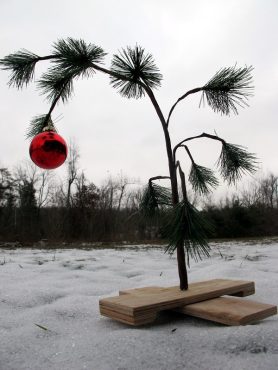It is not the season to be jolly for everyone

Photo by Leon Frankie via Flickr.
Well, it’s the most festive time of the year again. People decorate their houses with fairy lights, massive inflatable Santa Clauses, reindeer, and Christmas trees.
Soon, most families in Canada and worldwide will get together and have dinner with their loved ones, open presents under Christmas trees, sing Christmas carols, and enjoy hot cocoa or eggnog near fireplaces. These are the things that most people in Canada, whenever they hear the word “Christmas” or receive a comment such as “happy holidays,” primarily think about. That is not quite the case for me.
I grew up in a Pakistani household that mainly did not celebrate Christmas. We celebrated Eid for the most part, but towards my middle-teenage years, my family started to go to Christmas lunches. Cultural globalization is the root cause of this evolution.
The most exciting time of the year for the Muslim community is Eid, our version of Christmas. Muslims celebrate two Eids, Eid-al-Fitr and Eid-al-Adha, which are of equal importance and each three days long. However, the former is more popular as it comes directly after the arduous Ramadan.
Contrary to most Canadians, whenever I mull over the words “togetherness” and “family,” Eid automatically pops up in my mind. Going to early morning Eid prayer with my father and siblings, visiting my family friends, and having a traditional Eid lunch at my great-grandmother’s house are the situations I think about whenever somebody says “happy holidays” to me. I cherish these memories and sometimes yearn to experience them again.
I spent the first two years of my post-secondary education in Vancouver. Since I was scheduled to start my studies at Columbia College (a two-year post-secondary college) in early January, I landed around Christmas. I remember going out to Robson Square with my family (who came to Vancouver to help me get settled) and behold, there was a 76-foot, overly-decorated Christmas tree right in front of our eyes. We were in awe of that massive Christmas tree, but deep down inside, we knew we were not as thrilled about the tree as the family next to us. As for myself, a new international student at that time, a subtle sense of not belonging became a subconscious part of my brain.
To be clear, I am not against the notion of celebrating Christmas. Everyone has the right to celebrate their religious festivals. Also, if families from other religions want to celebrate Christmas, they should do that, as it is their personal choice.
A 2019 survey by the Angus Reid Institute suggests that Canadians progressively see Christmas as a secular holiday rather than a religious one. This could be the reason behind the celebration of Christmas by non-Christian Canadians. However, peer pressure and conformity to societal norms may also be contributing factors here. Hence, nuanced societal assimilation is potentially manifesting in this situation.
Furthermore, everything is excessively Christmas-centric or commercialized at this time. The Christmas ads on YouTube with celebrities, malls with their flamboyant decorations, and overly-decorated houses are evidence of this Christmas-centrism. We seldom see this exuberance in Canada, especially amongst Anglo-Saxon Canadians, when it’s Eid, Diwali, Hanukkah, or Vaisakhi.
In recent times, I have observed that efforts have been made by the Canadian government and businesses to truly reflect their multicultural status — more so than a couple of decades ago. Whether it’s Eid, Diwali, Hanukkah, or Vaisakhi, Canadian dignitaries and businesses acknowledge these religious holidays and send heartfelt messages to members of respective religious communities. However, in my opinion, these celebrations are not recognized with the same intensity and conviction as Christmas. Gauging the current Canada we live in, I believe it is highly improbable that other religious holidays will ever be as commercialized as Christmas.
If this time of the year is Christmas-centric and overly commercialized, then other religions have the right to do the same when they celebrate their religious holidays. It depends on if they want to be this way. As a Muslim, I would love to see every second commercial about Eid and some kind of Eid sale in Canadian retail businesses.
Moreover, only Christmas, a predominantly religious holiday, has statutory holiday status in Canada. This is a bit unfair for people of other religions as they mostly have to use their vacation days or get special permission from their employers to be a part of their religious festivities. Let’s make other religious holidays statutory holidays as well!
Like a broken record, Canadians proudly claim to be the pioneers of multiculturalism policy. At the moment, this policy is just rhetoric and, thus, a myth. However, if other religious festivities become statutory holidays, we can officially state that Canada has taken baby steps to becoming a multicultural state. Only under this hypothetical scenario can we officially say that other religious holidays are equally the most wonderful time of the year.







